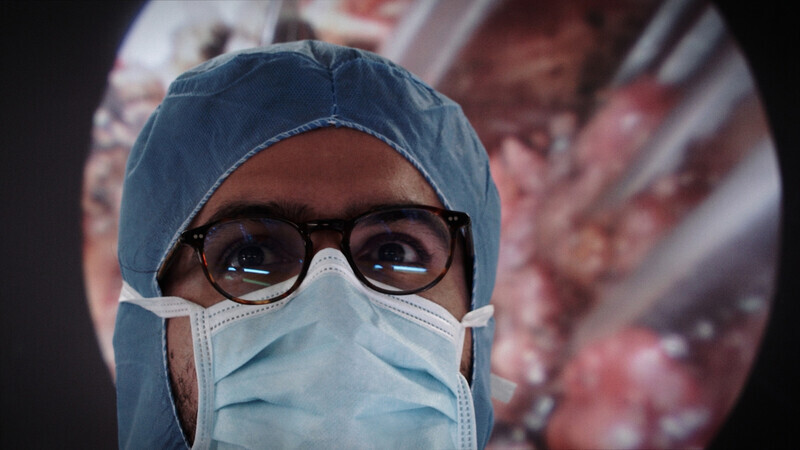
David Cronenberg's "Crimes of the Future" shares a title with an early, hourlong film that the Canadian director put out in 1970, even though, as Cronenberg himself has indicated, the movies have no obvious connection. But the 2022 "Crimes of the Future" could easily swap titles with another of today's Cannes debuts, "De Humani Corporis Fabrica" (literally, "the workshop of the human body"), the latest feature from Verena Paravel and Lucien Castaing-Taylor of Harvard Sensory Ethnography Lab, which sounds like the name of an institution Cronenberg would invent for a screenplay.
Both films invite viewers to stare long, hard, and thoughtfully at the contours and horrors of our anatomy. Both are situated at the intersection of biology and art. And while your intestinal fortitude may vary, "De Humani Corporis Fabrica" is the one for which I'd most recommend not eating beforehand.
By Cronenberg standards, the much-anticipated "Crimes of the Future" is almost serene. His films have employed cancer metaphors before, but unlike "The Fly," "Crimes" raises the curtain on a protagonist who's already at something like stage four. It takes place in a world where pain is, for the most part, no longer felt, and it involves characters who must open themselves, in more than one way, to the possibility of potentially fatal new sensations and death. It's a film about acceptance of one's body and of one's artistic corpus, which for these characters—and for the director, the dean of body horror—amount to the same thing.
You definitely have the sense that Cronenberg, now 79, and making his first feature since "Maps to the Stars" in 2014, is looking back over his whole career to make a grand statement. The squishy special effects recall the bio-ports of "eXistenZ"; the strange eroticism of the lacerations here evokes the vehicular sensualism of "Crash"; Carol Spier's production design has the hallucinatory dinginess of "Naked Lunch"; a child produces a digestive solvent that seems chemically related to Jeff Goldblum's saliva in "The Fly." And when a woman sucks on the still-fresh, "Videodrome"-like incision on a man's abdomen, he is forced to slow her down. ("Careful," he says. "Don't spill.") In the sense that the new "Crimes of the Future" brings Cronenberg's career full circle, maybe the title's link to his early filmmaking has a meaning after all.
Shot in Greece instead of Cronenberg's usual Toronto, the movie, which Cronenberg also wrote, is set in a dystopian (but perhaps bleakly hopeful) future when human bodies have started to evolve in what we are told are "uncontrolled" and "insurrectional" ways. Saul Tenser (Viggo Mortensen) is simply ahead of the curve: His body has been producing random organs for years. This makes him an object of fascination for Wippet (Don McKellar) and Timlin (Kristen Stewart), who work at a clandestine government registry cataloguing new bodily formations.
Saul has parlayed his life—or at least his biology—into his life's work. He is a performance artist who allows the removal of his rogue organs to be performed live, courtesy of Caprice (Léa Seydoux), a former trauma surgeon who also qualifies as Saul's intimate partner, at least in a world where, as Timlin says, "surgery is the new sex." You might say he's an instinctive artist, and the question of how much will he has over his creations might be a sticking point for critics. “I never really know when I’m working on something new,” he remarks, apropos of whatever random appendage his cells are generating at the moment. And as in art, knowing the boundaries of transgression is important. A strange figure named Lang (Scott Speedman) approaches Saul and proposes a performance that may not be strictly legal.
Indeed, "Crimes of the Future" may be the closest that Cronenberg has come to making a pure film noir. The various alliances and double-crosses are complicated enough for "The Big Sleep," government conspiracies are hiding in plain sight, and the police are cracking down on what they call "new vice," their name for evolutionary mutinies. Yet for all its mysteries and labyrinthine plot, "Crimes of the Future" is an oddly poignant film about not resisting what the future brings—criminal, unknown, or otherwise.
"De Humani Corporis Fabrica," showing in Directors' Fortnight, does for the eye, the brain, the spine, and the prostate what Castaing-Taylor and Paravel's "Leviathan" (2012) did for working parts of a Massachusetts fishing trawler: home in on them at extremely close range, to the point where even the most familiar and intimate sights become strange and terrifying. The surface of the eye becomes the stuff of solar flares. Tumor cells on slides begin to look abstract expressionist.

The filmmakers, experimental documentarians whose work is part art and part science, filmed in eight French hospitals using a variety of medical and nonmedical cameras, with the bulk of the shooting, according to Castaing-Taylor in the press kit, occurring with a specially designed lipstick-size camera that fell somewhere in between. The human body is the subject of art in other regards. Who is to say that medicine can't be one of them?
Paravel and Castaing-Taylor's visual range extends from the macro to the micro, from the graffiti-strewn back passageways of hospitals to the parts of the brain. The title, taken from Andreas Vesalius' pioneering 16th-century study of human anatomy, evokes the idea of doctors as artisans, and we see them working as such, using a mallet and other tools to correct kyphosis, an abnormal curvature of the spine. The surgeries are not identified explicitly, and even the body parts aren't always immediately recognizable, though it is generally possible to glean what's happening from context.
The doctors' craftsmanship—we hear them liken their work to video games, Legos, and construction sets and also have slightly alarming conversations ("What are you doing?" "I don't know")—is a source of both amusement and amazement. And if treating sickness and healing as the basis for art seems in some ways troubling, bear in mind that "De Humani Corporis Fabrica" is, like Frederick Wiseman's "Hospital" or "Near Death," a movie that simply has everything: sadness and humor, death (at the morgue) and birth (when we see a Caesarean section), camaraderie and coldness. For a film that appeals to the eye, the ear, and—insofar as it might turn your stomach—the gut, it is deeply moving.
Ben Kenigsberg is a frequent contributor to The New York Times. He edited the film section of Time Out Chicago from 2011 to 2013 and served as a staff critic for the magazine beginning in 2006.





